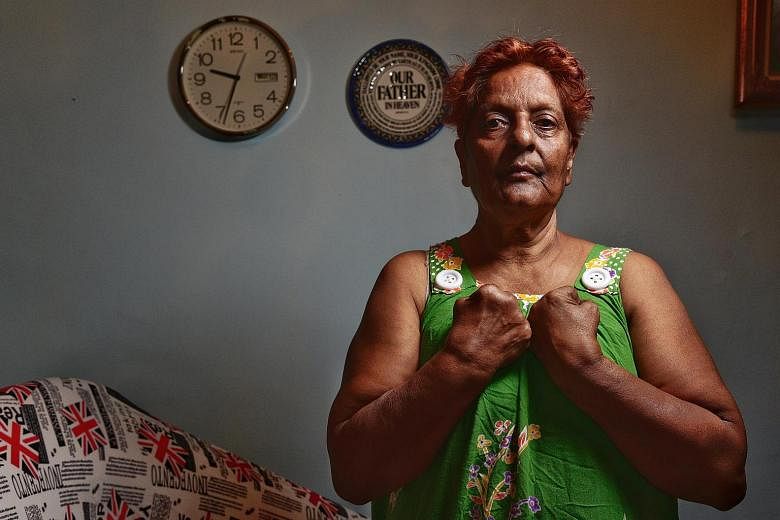The arrest of a 73-year-old woman and the subsequent use of hand and leg restraints on her has raised the question of whether more discretion should be used in the handling of elderly persons in custody.
Several lawyers and observers suggest that the police consider alternatives when dealing with an elderly person such as Madam Josephine Savarimuthu. They also question the need to use security devices in escorting her from prison to court for a low-risk municipal offence.
Madam Savarimuthu was arrested by police on March 4 at a neighbourhood police centre while making a report for a lost pawn ticket.
It emerged there that there was an outstanding warrant of arrest issued by the court last year. This was for failing to attend court relating to a town council summons - for the wrongful placement of potted plants outside her flat.
In a statement yesterday, police maintained she was not restrained while in custody and appeared alert, coherent and communicative.
She was asked if she wanted to call someone to bail her out, once at the police station, and then in court. She declined both times.
It was only when she was being escorted between the courts and Changi Women's Prison (CWP) that she was restrained at the hands and legs. This is part of the prison service's standard operating procedures, which include preventing people in custody from harming themselves.
Her daughter Gertrude Simon, 55, expressed dismay about her mother's treatment and urged a review of procedures. She came to learn of her mother's case after Madam Savarimuthu was remanded in CWP, about seven hours after the arrest.
Commenting on the case yesterday, Association of Criminal Lawyers of Singapore president Sunil Sudheesan said "sensitivity in dealing with the elderly is vital, but this has to be balanced against the protection of the detained persons from themselves and those escorting such persons".
He added: " I do see the merit of having the next of kin informed within a reasonable timeframe. This is, of course, mired in its own difficulties. I have sympathies for both sides."
Veteran lawyer Singa Retnam said it would have been better if police had the discretion to go to her house at the time of arrest to verify who was her next of kin and alert them even if she refused bail.
He said such exceptions could be considered given that she was an elderly person with medical conditions, and her arrest was in relation to a municipal offence.
Ms Jolene Tan, head of civic body Aware's Advocacy and Research Group, said given that Madam Savarimuthu was an elderly woman arrested for a non-serious, non-violent offence and no information had been given about particular risks she posed, neither handcuffs nor leg restraints appear appropriate.
Restraints can be very stressful and intimidating, especially for vulnerable groups.
" In our view, SOPs should not automatically prescribe the use of restraints for people in custody," she said. "Instead, there should be a decision-making process which considers factors such as the severity of the offence, whether it is violent or non-violent, and characteristics of the suspect such as age, gender and disability."
Former civil servant Sheikh Ahmad Adam, 70, who has worked in the security sector, said he was "very disappointed" at seeing a 73-year-old woman in such circumstances, adding that more discretionary measures should have been taken.
But Mr Sunil said:" The problem with discretion is that when things go wrong, the individual officer who decided to exercise an amount of discretion will take the brunt of the blame. So I can understand why there is a strict adherence to established procedures.
"I think procedures were correctly followed here, but we can study the need to handcuff and restrain the elderly, especially in minor cases, and review the arrest process.
"The balance, as always, rests somewhere in between, and I am confident that considered thought will be put into this."


